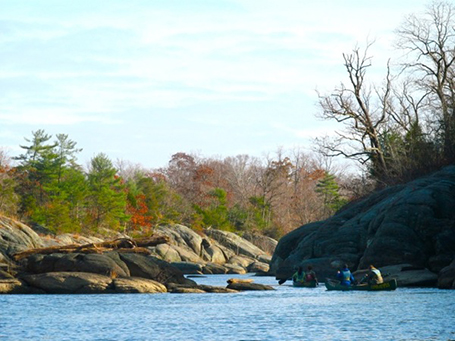Environmental humanities
New minor brings together science, humanities to study complex issues

A new undergraduate minor will use tools and insights from the humanities to extend and strengthen the University of Delaware’s longstanding expertise in exploring environmental issues through the natural sciences, engineering and public policy.
The interdisciplinary minor in environmental humanities received final approval from the University’s Faculty Senate at its March meeting.
“There’s been an explosion of interest in environmental issues in various areas of the humanities,” said Adam Rome, associate professor of history and one of the creators and faculty advisers for the minor. “The humanities have a perspective that’s useful for seeing the forest, not just the trees, and looking at these scientific problems from a humanities perspective gives new insights.”
Students in the environmental humanities minor will take three core courses ? Environmental Literature (in the Department of English), Nature and History (Department of History) and Environmental Ethics (Department of Philosophy) ? and three electives. One elective is required to be from the humanities, one from the sciences and one from either humanities or social sciences.
“So, a student could take these six courses in six different departments and areas of study,” said McKay Jenkins, who is Cornelius A. Tilghman Professor of English and the other developer and faculty adviser for the minor. “We decided not to have a single, interdisciplinary course, so our students will choose their classes and do the integrating themselves. The key is that we wanted to get science students into humanities courses and humanities students into science courses.”
The electives encompass numerous departments and colleges at UD, including art history, anthropology, biology, animal and food sciences, wildlife conservation, entomology, geography, communication and sociology, among others.
Rome said he expects many traditional humanities students who are interested in the environment to choose the minor as an area of specialization, but he and Jenkins also foresee interest from students majoring in natural sciences, social sciences and even such fields as business administration.
“I find more and more students who are interested in the environment and who are realizing that there’s virtually no profession that can’t be part of the solution to these problems we’re facing,” Rome said. “People are becoming aware that there are big environmental challenges, and they want to understand and become part of addressing them.”
Jenkins thinks the study of environmental humanities is an academic area with staying power.
“Studying and understanding the environment doesn’t seem like anything that’s going to come and go; if anything, it’s going to become more important,” he said. “It’s hard to imagine being an educated person, being part of the world, without having some environmental literacy.”
The environmental humanities initiative
The idea of developing a minor began a few years ago when Jenkins, whose writing and teaching have increasingly involved environmental topics, chaired a search for a new faculty member to specialize in environmental humanities in the College of Arts and Sciences.
After Rome was hired for that position ? “a perfect fit,” Jenkins said ? it was the start of what would expand into the kind of curriculum focused on environmental humanities that both of them were interested in developing.
In addition to Jenkins and Rome, the group that planned UD’s environmental humanities initiative included Susan Barton, extension specialist and associate professor of plant and soil sciences; Jacob Bowman, associate professor of wildlife ecology; Huantian Cao, associate professor of fashion and apparel studies; James Kendra, associate professor of public policy and administration and director of UD’s Disaster Research Center; Sandy Isenstadt, associate professor of art history; Del Levia, professor of geography; Victor Perez, assistant professor of sociology and criminal justice; Thomas M. Powers, assistant professor of philosophy and of public policy; and Ann Ardis, director, and Janis Tomlinson, associate director, of the Interdisciplinary Humanities Research Center in the College of Arts and Sciences.
About the faculty advisers
McKay Jenkins is the author of several books, most recently What’s Gotten Into Us? Staying Healthy in a Toxic World, and writes frequently on environmental issues. He teaches courses in subjects including environmental journalism and nature and meaning in American literature.
Adam Rome teaches courses in American environmental history and in environmental nonfiction and is the former editor of the journal Environmental History and the author of The Genius of Earth Day: How a 1970 Teach-in Unexpectedly Made the First Green Generation, published this month by Hill and Wang. The book has been widely praised and was featured in an April 15 “Critic at Large” piece in The New Yorker. Rome has discussed the book and his research in such recent venues as Radio Times on WHYY, at Georgetown University’s Center for the Environment, at Hagley Museum and Library and on the UD campus during Earth Week celebrations.
